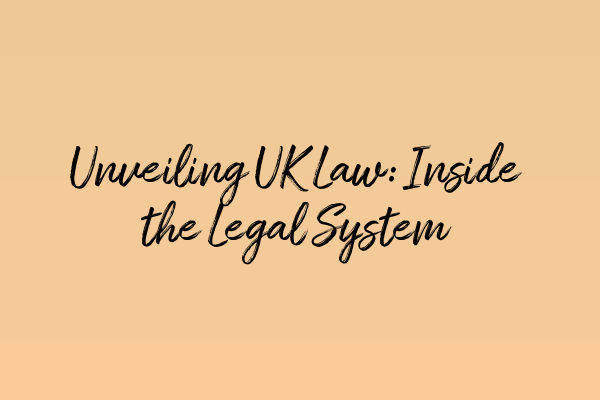Unveiling UK Law: Inside the Legal System
Welcome to our comprehensive guide to the intricacies of the UK legal system. Whether you are a law student, aspiring solicitor, or simply curious about how justice is served, this article will provide you with an in-depth understanding of the framework that governs our society. We’ll explore the structure, roles, and key components of the legal system, shedding light on the often complex processes that take place behind the scenes. So, let’s dive in!
The UK legal system is based on a common law tradition, which means that much of our law is derived from judicial decisions rather than legislative statutes. This tradition gives judges the power to interpret and apply the law in individual cases, which offers flexibility but also demands a deep understanding of legal principles and precedent.
At the heart of the legal system are the courts, which act as the pillars of justice. They are responsible for interpreting and enforcing the law, resolving disputes, and upholding the rights and liberties of individuals. The UK has a hierarchical court system consisting of four main tiers: the Supreme Court, the Court of Appeal, the High Court, and the Crown Court. Each court has its own jurisdiction and deals with specific types of cases.
The Supreme Court is the highest court in the UK and serves as the final court of appeal for civil and criminal cases. It is composed of the most distinguished judges in the country and is responsible for clarifying and developing the law. The decisions made by the Supreme Court are binding on all lower courts, ensuring consistency and uniformity in the application of the law.
Down the judicial ladder, we have the Court of Appeal, which hears appeals from the lower courts and decides on matters of law. It has the power to overturn or affirm previous court decisions, providing essential guidance on legal principles. Below the Court of Appeal, we find the High Court, which handles a wide range of civil and criminal cases. Its jurisdiction includes complex disputes, judicial reviews, and cases involving significant legal issues.
For criminal cases, the Crown Court takes center stage. It deals with serious offences such as murder, manslaughter, and robbery, among others. Here, complex criminal trials take place, requiring careful examination of evidence, cross-examination of witnesses, and skilled advocacy. The criminal justice system in the UK ensures fair trials and protects the rights of defendants, as laid out in the Human Rights Act 1998.
To initiate criminal proceedings, the Crown Prosecution Service (CPS) acts as the public prosecutor. However, it is worth noting that private prosecutions also exist, providing individuals or organizations with the ability to pursue criminal charges independently. Private prosecutions can be an effective way to seek justice in cases where the state may not have the resources or willingness to take action. To learn more about private prosecutions, check out our article: “Private Prosecutions: Exploring Non-Governmental Prosecutions in Criminal Cases.”
Understanding the intricate web of criminal law in the UK is essential for both legal professionals and individuals who want to stay on the right side of the law. Drug-related offences, for example, carry severe penalties that can range from fines to imprisonment. To familiarize yourself with the laws and penalties surrounding drug-related offences, take a look at our article: “Understanding Drug-related Offences: Laws and Penalties in the UK.”
As criminal cases progress, they may be heard in either the magistrates’ court or the Crown Court. The magistrates’ court deals with less serious criminal cases and conducts preliminary hearings for more serious offences. On the other hand, the Crown Court is responsible for conducting trials that require a jury and can impose more significant penalties upon conviction. For a detailed comparison between the two courts, don’t miss our article: “Magistrates’ Court vs Crown Court: Different Paths in Criminal Proceedings.”
Criminal defence lawyers play a crucial role in protecting the interests and rights of their clients. They employ expert strategies to challenge evidence, cross-examine witnesses, and craft compelling arguments. To learn more about the various defence strategies used in criminal trials, check out our article: “Criminal Defence Strategies: Expert Approaches to Protecting Clients’ Interests.”
As we’ve navigated the UK legal system, it’s important to remember that the procedures involved in criminal law can be complex and overwhelming. That’s why we’ve created a step-by-step guide to demystify criminal law procedures, providing a clear roadmap for anyone involved in the criminal justice system. If you’re interested in demystifying the process, take a look at our article: “Demystifying Criminal Law Procedures: A Step-by-Step Guide.”
In conclusion, the UK legal system is a complex and multifaceted entity, meticulously designed to uphold justice, protect individual rights, and maintain social order. Understanding the structure, roles, and processes within the legal system is essential for anyone entering the legal profession or seeking justice. We hope that this article has shed light on the intricacies of UK law, fostering a deeper understanding of its inner workings.
Remember to explore the related articles linked throughout this post to gain further insights into specific areas of the legal system. And if you have any questions or need legal assistance, feel free to reach out to our team of experts at Become Solicitor SRA. We are here to help navigate you through the complexities of the UK legal system.


Leave a Reply